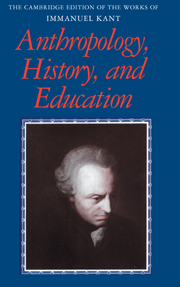Book contents
- Frontmatter
- Contents
- General editors' preface
- Preface
- General introduction
- 1 Observations on the feeling of the beautiful and sublime (1764)
- 2 Essay on the maladies of the head (1764)
- 3 Review of Moscati's work Of the corporeal essential differences between the structure of animals and humans (1771)
- 4 Of the different races of human beings (1775)
- 5 Essays regarding the Philanthropinum (1776/1777)
- 6 A note to physicians (1782)
- 7 Idea for a universal history with a cosmopolitan aim (1784)
- 8 Review of J. G. Herder's Ideas for the philosophy of the history of humanity. Parts 1 and 2 (1785)
- 9 Determination of the concept of a human race (1785)
- 10 Conjectural beginning of human history (1786)
- 11 Some remarks on Ludwig Heinrich Jakob's Examination of Mendelssohn's Morning hours (1786)
- 12 On the philosophers' medicine of the body (1786)
- 13 On the use of teleological principles in philosophy (1788)
- 14 From Soemmerring's On the organ of the soul (1796)
- 15 Anthropology from a pragmatic point of view (1798)
- 16 Postscript to Christian Gottlieb Mielcke's Lithuanian–German and German–Lithuanian dictionary (1800)
- 17 Lectures on pedagogy (1803)
- Editorial notes
- Glossary
- Bibliography
- Index
10 - Conjectural beginning of human history (1786)
Published online by Cambridge University Press: 05 May 2013
- Frontmatter
- Contents
- General editors' preface
- Preface
- General introduction
- 1 Observations on the feeling of the beautiful and sublime (1764)
- 2 Essay on the maladies of the head (1764)
- 3 Review of Moscati's work Of the corporeal essential differences between the structure of animals and humans (1771)
- 4 Of the different races of human beings (1775)
- 5 Essays regarding the Philanthropinum (1776/1777)
- 6 A note to physicians (1782)
- 7 Idea for a universal history with a cosmopolitan aim (1784)
- 8 Review of J. G. Herder's Ideas for the philosophy of the history of humanity. Parts 1 and 2 (1785)
- 9 Determination of the concept of a human race (1785)
- 10 Conjectural beginning of human history (1786)
- 11 Some remarks on Ludwig Heinrich Jakob's Examination of Mendelssohn's Morning hours (1786)
- 12 On the philosophers' medicine of the body (1786)
- 13 On the use of teleological principles in philosophy (1788)
- 14 From Soemmerring's On the organ of the soul (1796)
- 15 Anthropology from a pragmatic point of view (1798)
- 16 Postscript to Christian Gottlieb Mielcke's Lithuanian–German and German–Lithuanian dictionary (1800)
- 17 Lectures on pedagogy (1803)
- Editorial notes
- Glossary
- Bibliography
- Index
Summary
TRANSLATOR'S INTRODUCTION
Johann Gottfried Herder (1744–1803) had been Kant's student in Königsberg between 1762 and 1765, but was well known during the 1770s as a critic of the Enlightenment. In 1784 he produced the first volume of his greatest work, Ideas for a Philosophy of the History of Humanity. Kant reviewed the first two volumes, containing books 1 through 10, for the Allgemeine Litteraturzeitung in the January and November issues of 1785.
Book 10 of Herder's Ideas contained an account of the earliest ages of human history. It was based on a creative interpretation of the biblical book of Genesis, and was designed to drive home some central points in Herder's critique of the Enlightenment. Herder sees human beings as destined by God for a life of innocent contentment, and originally as standing in natural harmony with the divine, whose spirit is expressed through all folk cultures, poetry and religion. He views the Fall as the self-assertion of human reason, which corrupts human life and brings misery on human beings when it claims an authority over human life that is detached from our larger humanity and made independent of these supernatural resources of revealed knowledge.
Herder's first expression of these ideas had come in his Oldest Document of Humankind (1774), to which Kant had reacted quite negatively, and expressed in letters to J. G. Hamann (who had also been Herder's mentor).
- Type
- Chapter
- Information
- Anthropology, History, and Education , pp. 160 - 175Publisher: Cambridge University PressPrint publication year: 2007
- 5
- Cited by

